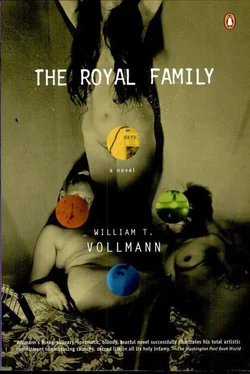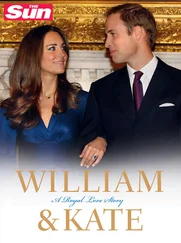(I feel a little nervous, Strawberry had said to the two men as they held the door for her, but you gotta do what you gotta do.)
And suddenly Tyler turned away in a revulsion of frustration and rage against that sinister world he used to know well. He couldn’t believe that the concrete hereabouts even held the impressions of his Queen’s darling footprints. He longed now for light and space, where his exalted Queen might perhaps be flying overhead.
Daringly he breached the eastern border of the Tenderloin (which the Queen’s girls always used to call the other side of the mountain) and came into the financial district, John’s kingdom, where the phony welcomingness of light fixtures in galleries, the groanings of cable cars, the promenading tourists, the slamming of car doors as passengers in a hurry ran away from stalled traffic, their high heels emphatically clicking, infected him with vindictive shame. Everybody literally turned up his nose at Henry Tyler! Just as booted feet sometimes twitch uselessly, scratching one another’s unscratchable itch, so he scratched together Queen and Irene in his head, and experienced only the same old disaster. He approached the old lady whose fur collar was twice the size of her head, and she departed him in disgust, as did the young black girl who was trying to be cool but who was obviously embarrassed by her own ghetto blaster. Another cable car passed by, the driver jazzily jangling his bell.
I just wanna show you this place, a father was explaining to his two sons, one of whom cast scared eyes on Tyler. The cable car’s bell jingled, its festiveness as brassy and fake as the bright warm diamonds of lamplight across the street.
Tyler thought to himself: I should really have it out with John. I should really…
On one of the columns of the Pacific Stock Exchange, a bas-relief girl with granite hair turned her head against the snow, diagonally bisected by shadow while with a superhuman lack of awkwardness she gazed across the street at the floral nipples and lion-heads which studded the facade of the eleven-storey building occupied in part by Radio Shack; around the corner (Pine and Sansome) rose a stubby brick building of about the same height overtopped by an immense white tower whose flag streamed in the cold sky, shrunk by distance to the slenderness of ribbon, a scarlet ribbon. Just as the skyscraper overshadowed the granite woman, so she in turn dwarfed the kiosk a mere twenty feet high on one of whose curving sides a sultry, Italian-looking model with rouged and parted lips gazed straight at the steps, all the more fiery by contrast with her icy-blue halter-top above which the necessary hint of cleavage began; the advertisement (for what, lurking Tyler couldn’t see) had frozen her in the act of cocking her hip, which had a black leather belt-pouch slung on it. Perhaps the granite woman was actually looking down at her; that must have been the reason her turned head was pressed so uncomfortably against the stone she was made of. The model, however, did not seem to perceive her elder sister. Flushed and ready, she gazed vaguely into space. Amidst the river of human beings now approaching on Sansome Street came John in a pinstripe shirt. He barely made it up to the model’s knees, which of course remained hopelessly far beneath the soles of the granite woman’s feet. Then Celia in her sunglasses and high heels came hurrying up the sidewalk, holding an iced latte. Neither of them looked up at the Queen of Mammon. They clasped arms around each other’s shoulders. John needed her to try on a new pair of shoes. After they departed, a swarthy pigeon landed and kissed the specks of filth at the granite woman’s feet.
Four o’clock, and the downtown streets were stricken with a bad case of the shadows as John’s colleague and rival, Roland, bought a newspaper and stood on the corner with his bulging attache case, waiting for his wife to pick him up and drive him to Sutter and Kearney. (John for his part used to like to have Irene drive up California Street when she was chauffeuring him home from the office. The Pacific Bank’s golden letters passed on his left, then the obsidian tower of Great Western Bank, and at Montgomery the trolleytrack-grooved street shot up into the sun where a summit of flags and domes awaited him.) Advancing on him, Roland saw a black man in a black skull cap who was licking a cigarette, his sign saying HELP IF YOU CHOOSE. Roland looked away.
Tyler remained. A rich man approached. Tyler extended his hand.
Let’s see if I have more than three cents, sighed Mr. Rapp, dropping three shiny copper pennies into the panhandler’s palm. — Let’s see. Yup. You caught me at a good time. Here’s a quarter.
Thank you, bro, said the panhandler gravely, and Mr. Rapp felt strangely pleased that he was someone’s brother. The top of his head gleamed in the autumn sun as he crossed Grant Street, swinging his briefcase of Italian leather.
Tyler wanted to go to City Lights. He believed that he could remember every book he’d ever seen there. When Allen Ginsberg died, in April 1997, Tyler had paged through a glorious monograph on Soviet photography, compiled by Margarita Tupitsyo, he was pretty sure. He always used to drive there back in those days, penetrating the Broadway tunnel, which was yellow, tiled, curvy and sometimes empty; its light-strings had reminded him of the vertebrae of a dead snake. The Queen had done her business in that tunnel sometimes. One he’d picked her up there and given her a ride someplace in his car, maybe to one of those cafes just north of City Lights where the capuccinos in their snow-white cups were not just foamy but full-bodied, the foam itself stiff and striped, gilded and brown, like crème brûlée. He remembered the smell of cigarettes and the sound of Italian speech. But no; that hadn’t been the Queen he’d been with there, but the false Irene. And since the false Irene had been involved, maybe it actually hadn’t been very much fun. Where had he driven the Queen? It couldn’t have been to City Lights; he’d never seen her reading any book except the Bible. It had always been difficult to find a parking place around City Lights. At least he didn’t have that problem anymore. He started to walk up Columbus Avenue but by the time he got to City Lights he realized that he was too ashamed of his own stench to go inside.
Joining the long line of human beings in sweaters, coats, caps and boots who waited for a meal at Glide Memorial, he remembered very well how many times he’d driven by them in the old days when he had a car and a job and was following some unfaithful banker through the Tenderloin or was going to meet Irene. He remembered that dinner with Irene so long ago now at the Kabuki Cho restaurant with its sashimi dashboard clocks. — Please don’t tell any of this to John, she’d said. — The man in the yellow GLIDE STAFF windbreaker ignored everyone until four, when he suddenly began taking meal tickets, chatting on a walkie-talkie while the first bunch went through. Majestically, he held up his hand to halt the line. Tyler was still far away, about two-thirds of the way down. He felt very hungry. The staff man was pawing through a trash can with one gloved hand. Then he yawned and turned away from the homeless ones, gazing up at skyscrapers and signs with a disdain entirely befitting the representative of a despotic theocracy. Tyler shifted his aching feet and blew on his hands. A cigarette stub in a scowling mouth shot past. He remembered one day when the Queen in her black high-heeled boots was dancing to the radio while the tall man sat with his head in his hands.
Now the man in yellow was accepting the second batch of tickets. They moved quickly and happily past him, heading for the entrance beneath the blue awning. One unauthorized being tried to creep in, but the man in yellow extended a long black gloved finger and he tumbled back to his place. Everyone halted at the next silent command, waiting with their hands on their hips or folded behind their backs or hidden in their pockets. Tyler felt very tired now.
Читать дальше












